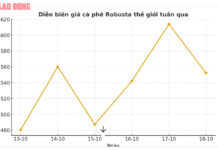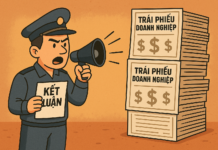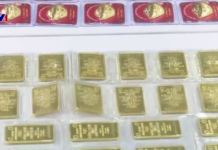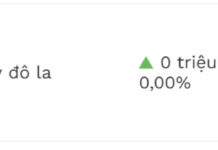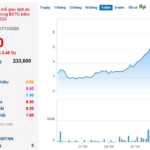Only One Business Submits Bid
The State Bank of Vietnam (SBV) has just sent an official dispatch to credit institutions and enterprises announcing the cancellation of the gold bar auction on April 25th due to only one entity submitting a bid.
Thus, this is the second time the auction has been postponed for the same reason: a lack of bidders. Earlier, on April 22nd, the SBV also announced the cancellation of the first auction.
According to the plan, the SBV will conduct an auction to sell gold bars on the morning of April 25th. The total volume of gold bars auctioned remained unchanged compared to the previous auction on April 23rd (16,800 taels of SJC gold bars). The reference price used to calculate the deposit value increased sharply by VND 1.6 million/tael compared to the previous auction, reaching VND 82.3 million/tael.
The maximum auction volume that a member is allowed to bid is 20 lots (equivalent to 2,000 taels). Each bidding member is only allowed to register 01 minimum price that is equal to or higher than the floor price announced by the SBV.
Previously, in the auction on April 23rd, only 2 members won the bid with a total winning volume of 3,400 taels, equivalent to 20% of the gold volume offered for auction. Thus, up to 80% of the gold volume that the SBV offered for auction was “unsold”.

Illustrative photo
Why are Businesses Not Interested in Bidding for Gold Bars?
In the bidding invitation announcement, the SBV stated: In case it is unable to purchase gold from the international market because its partners do not have enough gold to supply according to demand, the State Bank will decide to cancel the auction result.
According to economic expert Assoc. Prof. Dr. Dinh Trong Thinh, after the auction, if there is not enough gold, the SBV has the right to cancel the result, so the risk for the bidding units is very high.
In addition to having to bid according to the market, the price of gold fluctuates and is difficult to control. Now, after bidding for the SBV’s gold, they announce that their partners did not provide enough. As such, the SBV does not have to compensate, and the businesses participating in the gold bidding bear the risk.
In order to attract the participation of many units in the bidding sessions and ensure the success of the next bidding sessions, Assoc. Prof. Dr. Dinh Trong Thinh said that it is necessary to establish an appropriate price level for bidders to calculate their benefits.
The deposit must also be considered. Currently, the deposit is 10%, which is also considered quite large and makes many businesses hesitant, said the expert.
Some economic experts say that gold bidding is only a temporary solution to increase supply to the market, not a fundamental solution to resolve the unreasonable gold price gap as it is now.
The narrowing of the gold price gap between domestic and world prices requires trade measures and compliance with international practices. That is to allow qualified companies to import and export gold, using taxes and electronic customs to manage it.
According to the viewpoint of Dr. Dinh The Hien, Director of the Institute of Information Technology and Applied Economics, the regular supplementation of supply by allowing gold imports will help narrow the gold price gap.
Dr. Dinh The Hien noted that in order to grant gold import quotas to businesses, it is first necessary to conduct comprehensive research to calculate the annual gold demand of the people. To do so, it is necessary to calculate how much Vietnam’s added value is each year and with that added value, how much can be accumulated in the form of foreign currency or gold, from which it is possible to calculate the reasonable amount of gold imported into Vietnam.



